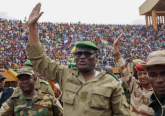2014 is a pivotal year for Afghan Politics. With the withdrawal of NATO troops, the 2014 elections have the potential to determine the country’s socio-political narrative. How these elections are conducted will impact the challenges and opportunities that Afghanistan will face. More specifically, what would this paradigm shift mean to a section of society that have come to represent one of its most repressed, neglected and disenfranchised aspects: the Afghan women.
After decades of war and instability, women have finally been able to participate in politics and other male-dominated spheres of Afghan society. After the fall of the Taliban regime in 2001, the increasing presence of women in the Parliament, occupying seats alongside ‘warlords’ and other prominent male figures, has been a progressive step. By law, more than 25% of the seats in the Afghan Parliament are reserved for women and has been one of the most important advances towards empowering women, politically. However, this remains a work in progress. Whilst these developments demand recognition, the gains are fragile and bear the potential to be reversed if sufficient attention is not paid towards creating an environment that is conducive and secure for women’s participation in the political realm.
Election campaigns and access to the electoral process continue to be affected by traditional barriers, security concerns, absence of female voters and female observer groups.Past elections reflect significant obstacles women have faced as candidates, voters as well as election workers. During campaigns, security of women politicians remains a constant concern. Election-related violence and insecurity are strong anxieties as a result of the NATO withdrawal and can exacerbate women’s vulnerabilities.
For many years, Afghan politics and policy-making has overwhelmingly belonged to the male domain: deciding the country and its people’s destiny. A just democracy is also an inclusive one. This demands greater capacity-building and enhancing decision-making of women in the public sphere for their country and aspects that impact them directly. Activism by parliamentarians such as Fawzia Koofi has resulted in educational reforms in institutions of higher education. Minister of Public Health, Dr. Suraiya Dalil’s efforts have resulted in substantial improvements in maternal health and girls’ education. Women’s presence in politics will enable them to bargain for their country’s future as well as their own.
More than the outcome, it is the processes of the 2014 election that will determine the fate of Afghan politics, especially the scope for women’s participation. Afghanistan bears the potential and promise for building a narrative of progress, equity and justice. However, this is not possible unless all sections of society are given equal opportunity to create history. This demands that the electoral process be as inclusive and non-partisan as possible for Afghanistan to realize a just and sustainable democracy. This demands that women’s participation as campaigners, voters and election workers is encouraged and protected. Women’s representation in politics has to be a right, not a privilege.
This post anticipates this year’s Weidenfeld Debate on: Women and Post-2014 Afghanistan: What is the West’s Responsbility? on 9th May, 2013. Speakers include Dr. Suraiya Dalil, Minister of Public Health, Afghanistan; Sir Sherard Cowper-Coles, former British Ambassador to Afghanistan and Frances Guy, the UN Women Representative for Iraq. http://www.weidenfelddebates.org/








No Comment